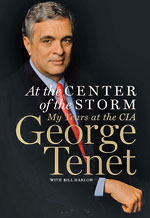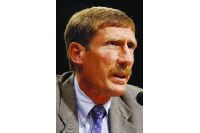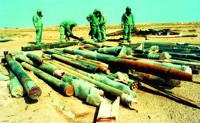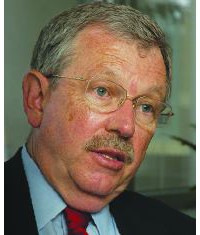Advertisement
Grab your lab coat. Let's get started
Welcome!
Welcome!
Create an account below to get 6 C&EN articles per month, receive newsletters and more - all free.
It seems this is your first time logging in online. Please enter the following information to continue.
As an ACS member you automatically get access to this site. All we need is few more details to create your reading experience.
Not you? Sign in with a different account.
Not you? Sign in with a different account.
ERROR 1
ERROR 1
ERROR 2
ERROR 2
ERROR 2
ERROR 2
ERROR 2
Password and Confirm password must match.
If you have an ACS member number, please enter it here so we can link this account to your membership. (optional)
ERROR 2
ACS values your privacy. By submitting your information, you are gaining access to C&EN and subscribing to our weekly newsletter. We use the information you provide to make your reading experience better, and we will never sell your data to third party members.
Policy
George Tenet's CIA
Former director's tome is a fascinating history-even as he dodges blame for some of the agency's most egregious failures
by Lois R. Ember
August 13, 2007
| A version of this story appeared in
Volume 85, Issue 33

George Tenet began his career in intelligence in 1983 as a staffer on the Senate Select Committee on Intelligence, eventually becoming its staff director. By 1992, he had moved on to become the intelligence director of the National Security Council in the Clinton White House. In 1995, then-president Bill Clinton tapped him to be deputy director of the Central Intelligence Agency. Two years later, he catapulted to the agency's top position, remaining director for the next seven years until his resignation in July 2004.
During those CIA years, Tenet takes credit for rebuilding a broken agency and restoring its morale. He rightfully boasts that he and his agency crafted the plan that successfully led to the ouster of the Taliban and al Qaeda in Afghanistan. And he praises his agency's hand in the disruption of the illicit, freewheeling nuclear technology bazaar masterminded and controlled by A. Q. Khan, the father of Pakistan's nuclear weapon.
To Tenet's great chagrin, those and other accomplishments he writes about in his memoir "At the Center of the Storm: My Years at the CIA" are for naught. Fair or not, Tenet will probably always be remembered most for two words: "slam dunk." He uttered them in reference to intelligence on then-Iraqi president Saddam Hussein's weapons of mass destruction (WMD).
Tenet blurted out this basketball metaphor at a December 2002 White House meeting on the dangers of Hussein's weaponry. The infamous phrase that he says was voiced without much thought came back to haunt him in spades. After the March 2003 invasion of Iraq and the subsequent failure to find Hussein's weapons caches, Bush Administration officials told journalists that Tenet's words gave President George W. Bush the green light he was seeking to proceed with a preemptive strike against Iraq.
Tenet spends a considerable amount of aggrieved verbiage on how his words were taken out of context to make him the fall guy for a badly managed and misguided adventure in Iraq, an adventure, he writes, that was a foregone conclusion long before he uttered those two misbegotten words. He writes, in fact, that he does not even know when the decision to go to war was made, a curious admission for someone who claims to have been at the center of the storm.
As this example underscores, Tenet's memoir—written with Bill Harlow, his chief spokesman at the CIA—is a self-serving tome chock-full of glib sports metaphors. It's an easy, if sometimes frustrating, read and, at over 500 pages, somewhat repetitious. It would have benefited from some judicious paring.

Still, the backstage maneuvering behind some of the most fateful decisions of the Bush Administration—from Tenet's viewpoint, of course—makes for engrossing reading. Remember: Tenet's tenure at the CIA spans two of his agency's most egregious failures: the Sept. 11, 2001, terrorist attacks and the prosecution of a war based on the false premise that Hussein and his WMD posed a looming danger to the U.S.
Tenet writes that when he received intelligence on July 10, 2001, about an imminent terror threat from al Qaeda, he rushed to the White House with two CIA colleagues to warn Condoleezza Rice, then national security adviser, of a "spectacular" attack within weeks or months. He asked that the President immediately give the CIA new authority to go after Osama bin Laden and his al Qaeda group.
The U.S.'s chief spy was briefing President Bush daily. Yet, by Tenet's own admission, he never took advantage of those direct contacts to ask the President for the new authority he felt his agency needed. When asked why he hadn't, he told a television interviewer that the President "is not the action officer," the national security adviser is. Rice never acted on Tenet's request and Sept. 11 happened.
Tenet's going directly to Bush might not have thwarted the terrorist attacks in New York City and Washington, D.C. But by not doing so, Tenet reveals both his by-the-book bureaucratic mind-set and lack of leadership when leadership might have made a difference.
He served two diametrically opposite presidents—Bill Clinton and George W. Bush—and by all accounts, he got along swimmingly with both. Colleagues have described him as the ultimate go-along, get-along guy, and from the tales he relates, Tenet confirms their assessment.
Throughout the memoir, Tenet unwittingly reveals his penchant for supporting positions he believes his patrons, especially the President and vice president, hold.
For example, Tenet writes that the CIA didn't believe there were strong links between Hussein and al Qaeda. He boasts of thwarting a speech Vice President Dick Cheney was to deliver that he, Tenet, believed went too far in linking the Iraqi president to the terrorist group. Yet, in a 2002 letter to then-Sen. Bob Graham (D-Fla.) supporting the Administration's public stance, Tenet writes: "We have solid reporting of senior level contacts between Iraq and al Qaeda going back a decade."
Tenet exhibits a stubborn reluctance to accept unqualified responsibility for errors, as his failure to get 16 controversial words removed from President Bush's 2003 State of the Union address demonstrates. In the fall of the previous year, the President was slated to deliver a speech in which he was to say that Iraq was trying to acquire yellow-cake uranium from Niger for its nuclear weapons program. Tenet, knowing this not to be true, insisted the words be deleted, and they were.
They slipped back into the 2003 State of the Union address, because, Tenet writes, he failed to read the speech before its delivery. To excuse his failure, Tenet writes that he was overworked and overwhelmed monitoring terrorist threats. Okay, but that was his job, as was having correct intelligence correctly conveyed to policymakers and the public.
Tenet grudgingly admits his error in believing that Hussein had active chemical, biological, and nuclear weapons programs. But he minimizes his blunder by writing that U.S. allies also believed that Hussein had them.
Erroneous intelligence informed the CIA's 2002 National Intelligence Estimate (NIE) on Iraq's unconventional weapons and was the underpinning for then-secretary of state Colin Powell's fateful speech to the United Nations Security Council on Feb. 5, 2003. The speech's raison d'Être was to justify the U.S. position that a preemptive strike against Iraq was urgent. Tenet admits the NIE was badly flawed.
Powell's speech, Tenet writes, "helped galvanize public support for the war." To an entranced UN audience, Powell—with Tenet sitting behind him—vividly described Hussein's chemical weapons caches, his mobile biological weapons production facilities, and his purchases of aluminum tubes for centrifuges to produce nuclear material. All these "facts" proved to be false.
Tenet admits: "We allowed flawed information to be presented to Congress, the President, the UN, and the world. That never should have happened." But before he reaches this damning conclusion, he expends a lot of ink on such excuses as having too little time to produce the NIE and having never seen CIA memos discounting a source, code-named "Curveball," on mobile biological weapons labs.
Tenet never fully explains how the warnings of flawed intelligence from other U.S. intelligence agencies failed to alter his and his agency's preconceived notions about Iraq's weapons. He does, however, spend a lot of time settling scores with Cheney and his neoconservative brethren at the Pentagon; with Rice; and with David Kay, among others.
Kay headed up the first CIA-led Iraq Survey Group searching for Hussein's elusive weapons after the active phase of the war ended. Kay's sin: He resigned his position after less than a year and returned to the U.S. to tell Congress—and the world—that Iraq had no WMD.
Like the good bureaucratic trooper he was, Tenet never blames President Bush for the poorly thought-out and ill-fated decision to go to war in Iraq. Bush, in turn, reciprocates by presenting Tenet in 2004 with the nation's highest civilian commendation, the Medal of Freedom. Tenet writes that he anguished over accepting the medal but, in the end, did so to honor his beloved CIA.
Read the book and decide for yourself whether Tenet's angst was justified. The memoir's facile, if sometimes simplistic, prose makes for good summer reading—if you have the stamina to lug around the hefty tome.
C&EN Senior Correspondent Lois R. Ember covers homeland and national security.





Join the conversation
Contact the reporter
Submit a Letter to the Editor for publication
Engage with us on Twitter